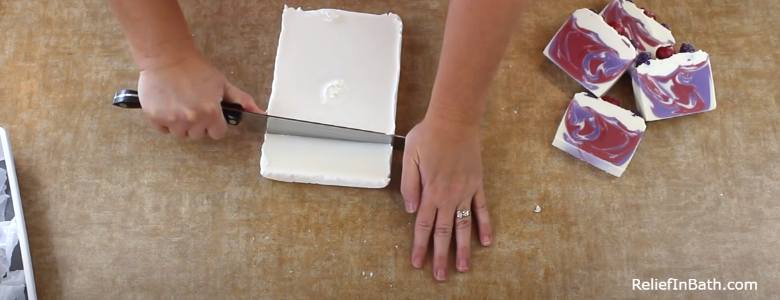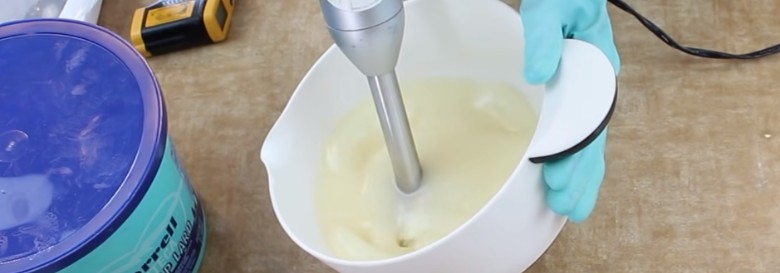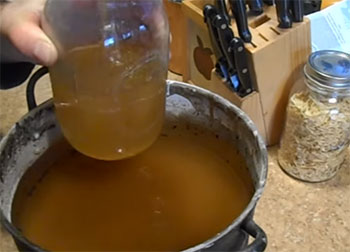Not everyone is fond of store-bought soaps for many reasons. So, yes, a small number of people still use homemade lye soap. You can pick your own ingredients and it has other benefits.
TO understand why some people still use this old form of soap and whether you should go for it too, you need to understand all the pros and cons of Lye soap.
That’s exactly what I intend to discuss. Have a cup of coffee and stay with me for a while.
What is Lye Soap?
Lye soap is made using a chemical reaction between oils/fats and a strong alkaline known as lye. Traditional lye is usually sodium hydroxide or potassium hydroxide. When mixed with oils under the right conditions, saponification occurs, turning the ingredients into soap.
Lye soaps typically contain only plant-based oils, lye, and water. The natural saponification process retains glycerin, a moisturizing byproduct. Essential oils or herbs are often added for fragrance and properties.
Modern commercial soaps use pre-processed chemicals and strip glycerin for use in other products. Lye soaps utilize traditional handicraft methods.
Benefits of Lye Soap

There are plenty of advantages of using lye soaps that have made it popular among lots of people. Let’s check a few of them:
- Satisfying Custom Needs
Some people are more sensitive than others. They can’t tolerate commercial soaps because of certain ingredients like detergents. pH level also plays a role.
So, a custom-tailored soap is great for them!
With lye soap, you can have your own soap satisfying your own choice with your own favorite ingredients like cocoa butter, Shea, olive oil, tallow, castor oil, and whatnot!
- Great Cleaning And Different Feel
Lye has the essential element to break down the dirt. So, lye soap is great not only for cleaning your skin but also for other cleaning purpose as well.
Besides, unlike commercial soaps, handmade soaps like lye soaps retain the natural glycerin. So, it gives people a different look that many people actually love.
For this reasons, lye is considered to be better than commercial soaps according to many people. Yes, you can use it instead of detergent too!
- All-Natural Ingredients
Lye soaps usually only contain plant oils, lye, water and natural additives. Many people prefer to avoid detergents, chemical preservatives and artificial fragrances common in commercial soaps.
- Saponified Oils Retain Glycerin
The natural saponification process leaves moisturizing glycerin in the soap. Commercial soap makers extract the glycerin for lotions and creams. Lye soap acts as both cleanser and moisturizer.
- Effective Cleansing and Lather
The alkaline lye interacts with oils to create an ideal soap composition for cutting grease, cleaning grime, and making bubbly lather. Lye soaps can match modern detergent-based soaps for effectiveness.
- Handcrafted with Care
Lye soap makers can customize soap ingredients, customize shapes, and control the curing process. There is artistry in traditional soap making lacking in mass-produced commercial soaps.
- Often Hypoallergenic
The pure, natural ingredients of a well-formulated lye soap avoid common chemical irritants and allergens found in commercial products like sulfates, fragrances and stabilizers.
- Environmental Sustainability
Lye soap-making has a low carbon footprint compared to mass commercial soap factories. Only natural plant oils are used rather than petroleum-derived detergents.
- Moisturizing Benefits
The lard collected from the pigs has fat. So, lye soap contains fat that has moisturizing benefits. When used in shower or for baths, it will help to maintain moisture of your skin perfectly.
- Requires Few Ingredients
All you need is lard, lye, and your hard work to make homemade lye soaps. For the oil purpose, you can add as many different type of oil as you like. Usually, store-bought soap has only 3 to 4 different oils.
If you already have any wood-burning stoves, you can collect lye from there. But for 100% pure lye, you should buy lye marketed for soap-making only.
Just FYI: you can collect lard from the pigs too. The lard will give you the necessary fat that you will need to make the soap at home.
- Saves Money
Since it requires only a few ingredients, making lye soap is a piece of cake if you have necessary skills. So, not only you won’t be spending money to buy store-bought soaps, it also makes you self-sufficient.
Imagine all the money you can save each month. Besides, it’s a great feeling to be self-dependent.
Lye Soap Problems

Let’s check out some of its disadvantages too:
- Extra Caution Required
Again, lye is a hazardous material. So, you need to handle it with care and precaution wearing safety goggles and long sleeves with gloves. You need to make sure the soap is well-balanced and won’t dry your skin.
So, the final product (your lye soap) can’t contain any lye. You need to make sure the lye has been used up during the process of converting the oils into soaps.
Besides, making such soaps at home requires hot-process of soap making. That’s pretty intense than cold-process soap making.
- Time Consuming
Lye soap making is a time-consuming process. It takes several days for the lye to build up its potency before you can use it to make soap.
So, you need extra patience!
- Not Ideal for Laundry
Lye soaps function best for hand-washing dishes and personal cleaning. They lack specialized surfactants and enzymes that modern laundry detergents contain.
- Can Dry Skin
Lye soap is powerfully alkaline. When not properly formulated with enough oil, lye soap can dissolve too much oil off the skin leading to dryness. Many find it too harsh for facial skin.
While rewarding to make, lye soap requires safety measures during production. Finished lye soap may also be too harsh for some people’s skin depending on the formulation.
- Caustic Lye Danger
Lye is extremely alkaline. Direct skin contact can cause irritation or chemical burns. Fumes during soap making can damage lungs. Proper safety gear and protocols are mandatory.
- Tricky Recipe Balancing
Achieving the right mix and measurements of lye, water and oils takes skill. Imbalances yield ineffective soap. Beginners struggle with formulating good recipes.
- Higher Cost
First of all, you need to buy the lye, right? Well, then you may have to pay a steep shipping cost because shipping companies charge higher for carrying hazardous items like lye.
So, if you don’t get your lye form the wood-burning stoves or don’t have any pigs, you will end up paying more money to buy those ingredients.
Should You Use Lye Soap?
Lye soap has many beneficial qualities from its traditional all-natural formulation and handcrafted production. However, safety precautions are required when making lye soap, and it may not suit all skin types after curing.

Lye soap is best suited for those wanting a natural, chemical-free cleansing product, and who have the skill and care to properly formulate and prepare it. With the right methods and recipe, lye soap can be an effective, eco-friendly alternative to commercial soaps.
However, lye soap is not generally recommended for casual or first-time soap makers due to the inherent dangers of using caustic lye. For those simply wanting an easy-to-use daily soap without specialized skin needs, mild commercial soap products may be the better practical option.
As with any handcrafted product, the quality and suitability of a lye soap comes down to the expertise of the soap maker and the care they take with ingredients and preparation.
While lye soap presents some hazards and limitations, its unique pros continue to attract artisan soap makers seeking to create an all-natural, traditional product.
Frequently Asked Questions (FAQ)
Every soap including lye soap is good for cleaning your skin when made by the hands of expert soap-makers. Technically, every soap has lye in it. But being a caustic substance, direct expose to lye can cause harm to your skin.
When made properly by the hands of expert soap-makers, lye-based soaps are completely safe.
Without lye, there is no soap. Without lye, it’s either just detergent or hand wash. SO, to make soaps, there has to be lye in them. You may not see it on the ingredient list of a soap, but it’s there!
Yes, it’s not only a good antibacterial, it’s a good cleanser too.
Apart from bathing and hand washing, you can use lye soap as a laundry detergent too. It’s as effective as any commercial grade soaps for such purposes.
Disadvantages of lye soap include:
1. Dangerous caustic lye required for saponification
2. Tricky to balance recipes correctly
3. Long curing time of 4-6 weeks
4. Short shelf life without preservatives
5. Not suitable for laundry use
6. Can dry skin if not formulated properly
Closing Remarks
Like any store-bought soaps, lye soap has both pros and cons as well. The main purpose of making such homemade soap is to include the ingredients YOU want.
That way you can make your own soap that suits your skin. It’s also a passion for extremely self-sufficient people.
But lye soap or any of such homemade soaps have to be made carefully and with expert hands.
Direct contact with lye is harmful and make sure you know what you are doing while making such homemade soaps.
So, I prefer to buy lye soap from my nearby family-run business because of all those hassle. However, if you buy it from someone else, read some reviews about their qualities first.
